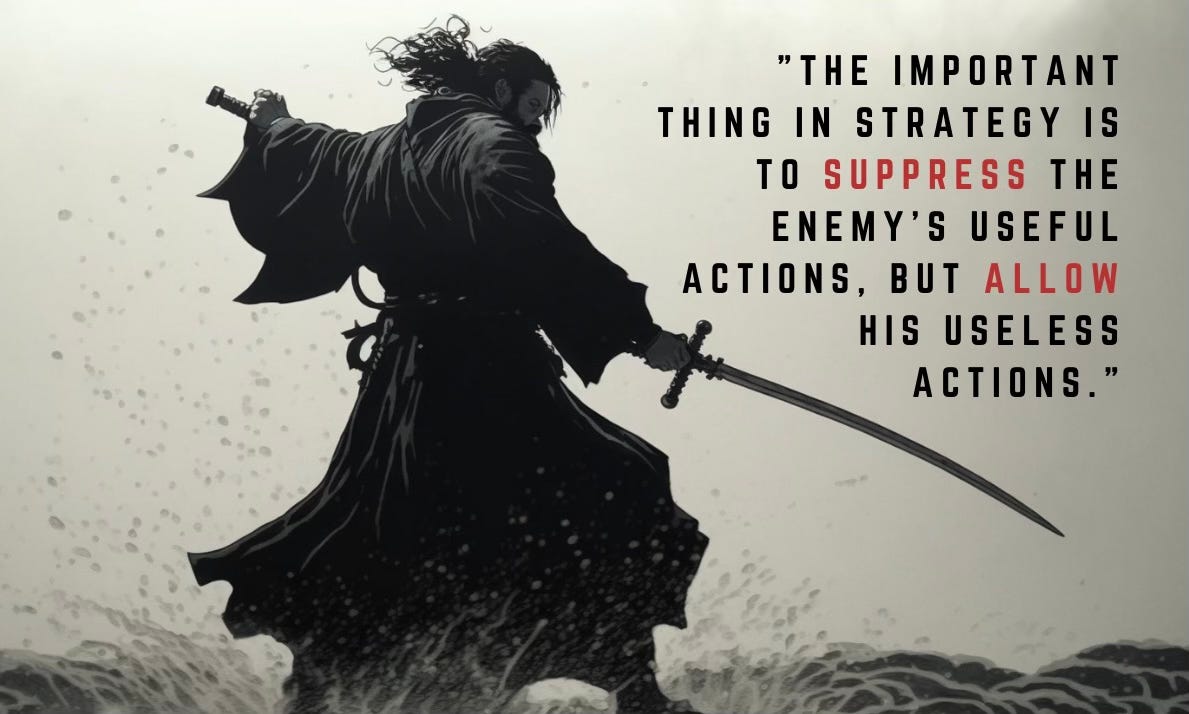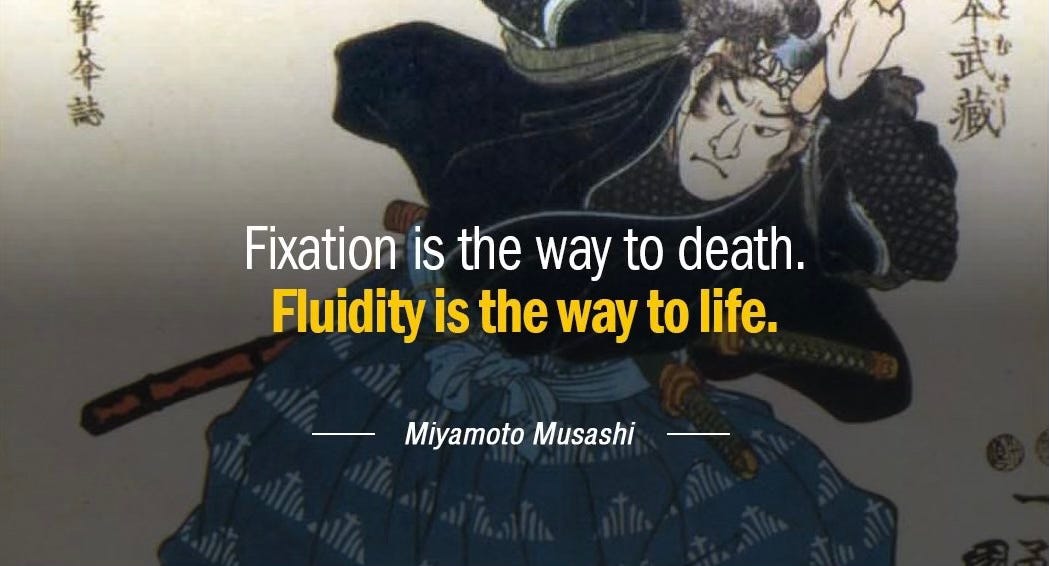“The blade can wound, but the mind can conquer”
Welcome to the last 2023 edition of Students of Leadership, today looking into the remarkable life of Miyamoto Musashi.
Renowned as a legendary swordsman, strategist, and philosopher, Musashi's life and teachings captivate and continue to inspire new generations centuries after his death.
The Life of Miyamoto Musashi
Miyamoto Musashi was born in 1584 in Japan during the difficult Sengoku period of civil wars and social unrest. This period formally initiated in 1467 with the Onion war which collapsed the feudal system in Japan. Musashi died in 1645, he was also known by his buddhist name, Niten Dōraku.
From an early age, Miyamoto Musashi displayed an extraordinary talent for the way of the sword. However, he was not content with merely mastering this art and his thirst for knowledge led him to study poetry, painting, calligraphy and strategy. Musashi's set himself apart from his contemporaries because of his relentless pursuit of perfection and unparalleled dedication to self-improvement. He was in many respects a true Renaissance man by the later European ideal.
Miyamoto Musashi was a Ronin or masterless samurai who holds the record for most undefeated duels in Japan: sixty-one.
The Teachings of Miyamoto Musashi
"The Book of Five Rings” goes beyond being a martial arts manual. It serves as a guide to strategy, mindset and self discipline that transcends time and offers lessons to anyone aspiring to master their craft and lead effectively. Musashi’s wisdom is presented in his book through five rings" (Earth, Water, Fire, Wind and Void)
1. The Earth Ring
This section lays the foundation by having a grounded approach to martial arts and strategy. Musashi emphasizes the crucial value of knowing the world around you and the criticality of seeing it clearly:
“Know the smallest things and the biggest things, the shallowest things and the deepest things. As if it were a straight road mapped out on the ground... These things cannot be explained in detail. From one thing, know ten thousand things. When you attain the Way of Strategy there will not be one thing you cannot see. You must study hard.”
Self awareness and Situational awareness are foundational elements to grounded leadership, as well as it is to know as much as there is possibly to know about the matters at hand.
This chapter finishes with a list of nine principles that act as a guide to build and maintain a strong character:
"Do not think dishonestly."
"The Way is in training."
"Become acquainted with every art."
"Know the Ways of all professions."
"Distinguish between gain and loss in worldly matters."
"Develop an intuitive judgement and understanding for everything."
"Perceive those things which cannot be seen."
"Pay attention even to trifles."
"Do nothing which is of no use."
2. The Water Ring
The ‘Book of Water’ serves as a metaphor for life's fluidity, flexibility and adaptability. Just as water molds itself to any shape it occupies, we should similarly learn to gracefully adjust to changing environments. The book revolve around remaining adaptable in the face of change and challenges because it is this adaptability what enables to fluidly transition across different areas of knowledge and thinking, especially when confronted with evolving situations and information.
“In strategy your spiritual bearing must not be any different from normal. Both in fighting and in everyday life you should be determined though calm.”
Musashi advocates for a balanced spirit, which he believes is intrinsically linked to a balanced physical state. Such equilibrium fosters inner strength, concealing any vulnerabilities from adversaries. In the heat of conflict, Musashi underscores the criticality of preserving spiritual steadiness.
"In the realm of strategy, your inner tranquility should mirror your outward demeanor. Possess a resolve that is unwavering yet serene."
3. The Fire Ring
This ring is about conflict management, it teaches the art of taking action, the art of the fight. It is the book most focused on fighting than all other chapters in the book.
It looks at martial arts as a whole from a bird's-eye view emphasizing the importance of observing the surroundings to process any situation, and act accordingly.
“As one man can defeat ten men, so can one thousand men defeat ten thousand. However, you can become a master of strategy by training alone with a sword, so that you can understand the enemy's stratagems, his strength and resources, and come to appreciate how to apply strategy to beat ten thousand enemies.”
What Musashi does in this chapter is to teach to grasp the rhythm of any situation to know when to take decisive action when the timing is right, when it aligns with the context and desire outcome.
If you can strengthen your assertiveness and timing in decision making, you will surely make most of the opportunities presented to you.
4. The Wind Ring
In this chapter Musashi changes the focus from writing on individual aspects of skills and strategy to the broader and more philosophical aspects of martial arts and strategy. The wind represents the invisible, the intangible.
However Musashi also warns of the overreliance on one set of tools because it could come with a lack of flexibility to adapt. For this reason he delves too into understanding and drawing lessons from others adversaries, highlighting the importance from studying competitors and enemies to help continuously evolve ones approach.
“Some other schools have a liking for extra-long swords. From the point of view of my strategy these must be seen as weak schools. This is because they do not appreciate the principle of cutting the enemy by any means.”
5. The Void Ring
Here we find the concept of 'Mu' or 'emptiness,' which links the philosophies of that which we can see and know and that which cannot be seen. It pushes the mind to a creative and intuitive level.
It is connected to the idea of “letting go” in order to avoid becoming a slave of all previous teachings. It is said that once the samurai has mastered the combat techniques resulting from the first four elements, he must then let go of everything he knows so the samurai master must become one with his sword, able to forge his new identity where he contemplates all techniques at once, switching styles on the spot until victory is achieved. The samurai becomes one with the sword, it flows, it’s void of fixed ideas.
“In the void is virtue, and no evil. Wisdom has existence, principle has existence, the Way has existence, spirit is nothingness.”
The concept of the void in Mushashi’s philosophy contains significant spiritual dimensions deeply connected with Zen Buddhism. It’s an invitation to a journey that looks beyond the surface to learn to perceive what cannot be seen or understood, such as things that are based more on instinct than knowledge.
Musashi believed that true mastery lies not in the accumulation of techniques but in the integration of mind, body, and spirit.
In summary, “The Book of Five Rings" serves as a guide to strategy, mindset and leadership. Its teachings advocate for an approach to challenges that emphasizes self awareness, adaptability, fluidity, decisiveness, continuous learning and an unwavering determination to achieve one's goals. It’s a worthwhile journey to reflect and internalize some of these principles.
As we extrapolate his teachings to our leadership journey I believe that the three most important insights from Musashi’s teachings are…
Learn
Adapt
Integrate
a) (Learn) Embrace the Way of Continuous Learning:
Musashi's relentless pursuit of knowledge teaches us that leadership is an ever-evolving journey, you will always be a student of your own craft. Nurture a growth mindset, constantly seeking new insights and expanding your skillset.
b) (Adapt) Master the Art of Adaptability:
Musashi's emphasis on flexibility reminds us that success lies in our ability to adapt to changing circumstances. Leaders must be agile, open-minded, and willing to embrace new approaches in order to thrive in a rapidly evolving landscapes.
c) (Integrate) Cultivate Inner Harmony:
Musashi's integration of mind, body, and spirit reminds us of the importance of holistic approach to leadership. Leadership needs clarity of thinking, endurance, emotional stability, caring for oneself and for others in order to make sound decisions and inspire people around.
Conclusion
Miyamoto Musashi's legacy as a master swordsman, strategist and philosopher continues to resonate in today’s world and certainly in the context of leadership development. His teachings on adaptability, continuous learning, and holistic leadership offer invaluable lessons that executives seeking to elevate their impact and build a strong character should incorporate into their toolbox.
By embracing the wisdom of Musashi, leadership becomes the compass and the roadmap to navigate complexity with confidence in skills and grace in style.
P.S. Before I go, here it goes the last and special “The Treat,” of 2023.
“Auld Lang Syne” (‘old long since’ or ‘times gone by’) is a beautiful Scottish song perfect for the occasion.
A New Year stands before you, brimming with possibility, don’t waste it!
“Lead yourself, Learn to live. Lead others, Learn to Build.”
If you enjoyed reading this post consider subscribing to the newsletter for free, joining the community and sharing your thoughts.








Happy New Year!
Thank you Nia!! Glad it resonated. Happy New Year!